Books on consciousness
A list of books relating to the hard problem of consciousness. Regularly updated cos I keep finding new stuff all the time.
A list of books relating to the hard problem of consciousness. Regularly updated cos I keep finding new stuff all the time.
2017
 Casey O’Callaghan
Casey O’Callaghan
Beyond Vision: Philosophical Essays
(Oxford 2017)
This volume brings together eight essays by O’Callaghan. They draw valuable lessons about perception, the nature of its objects, and sensory awareness, through sustained attention to extra-visual and multi-sensory forms of perceptual consciousness. O’Callaghan focuses on auditory perception, perception of spoken language, and multi-sensory perception. See Oxford | Amazon | Google
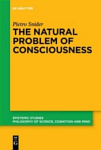 Pietro Snider
Pietro Snider
The Natural Problem of Consciousness
(De Gruyter 2017)
The natural problem of consciousness is that of understanding why conscious beings presently exist. Snider relates this problem to other problems in the philosophy of mind and emphasizes its diachronic dimension. Ranging over philosophy, biology, and neuroscience, he aims to understand why consciousness has evolved through natural selection. See De Gruyter | Amazon | Google
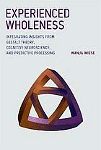 Wanja Wiese
Wanja Wiese
Experienced Wholeness
(MIT 2017)
How can we account for ‘phenomenal unity’ – our experience of objects, bodily experiences, successions of events, and the attentional structure of consciousness as wholes? Wiese develops an interdisciplinary account, showing how experiential wholes can be characterized and how such characterization can be analyzed conceptually and computationally. See MIT | Amazon | Google
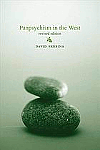 David Skrbina
David Skrbina
Panpsychism in the West
(MIT 2017, revised edition)
Originally published in 2005, this updated edition covers the emergence of mind from a non-mental reality and the combination problem in greater detail. It offers expanded discussion of the pre-Socratics, Plato, Continental panpsychism, scientific arguments, Nietzsche, and Whitehead; as well as new sections on Augustine and Russellian monism. See MIT | Amazon | Google
 Anders Hedman
Anders Hedman
Consciousness from a Broad Perspective: A Philosophical and Interdisciplinary Introduction
(Springer 2017)
An introduction to consciousness research within philosophy, psychology and neuroscience from a philosophical perspective and with an emphasis on the history of ideas. Hedman explores various approaches to consciousness and the mind-body problem, including mysterianist views and other radical approaches. The final two chapters present his personal view of the problem. See Springer | Amazon | Google
 Chauncey Maher
Chauncey Maher
Plant Minds: A Philosophical Defense
(Routledge 2017)
In this book, Maher first presents the contemporary case for thinking that plants do not have minds. This case is rooted in the idea that having a mind requires the capacity to represent the world. Maher then defends a relatively new approach that rejects this assumption, making room for the possibility that plants do have minds, primarily because they are alive. See Routledge | Amazon | Google
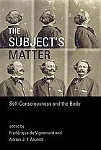 F. de Vignemont & A. J. T. Alsmith (eds.)
F. de Vignemont & A. J. T. Alsmith (eds.)
The Subject’s Matter: Self-Consciousness and the Body
(MIT 2017)
The study of the body in such disciplines as cognitive psychology, cognitive neuroscience, psychiatry, and neuropsychology has advanced dramatically in the last two decades, accompanied by a resurgence of philosophical interest in the significance of the body in our mental life. The 16 specially-commissioned essays in this book reflect the advances in these fields. See MIT | Amazon | Google
 Béatrice Longuenesse
Béatrice Longuenesse
I, Me, Mine: Back to Kant, and Back Again
(Oxford 2017)
What is self-consciousness and how does it relate to our use, in language and in thought, of the first-person pronoun ‘I’? Longuenesse presents an original exploration of our understanding of ourselves and the way we talk about ourselves and shows how Freudian metapsychology offers a path to a naturalization of Kant’s transcendental view of the mind. See Oxford | Amazon | Google
 Craig Callender
Craig Callender
What Makes Time Special?
(Oxford 2017)
Central parts of the time we live by—the structured time of life—have no counterpart in the fundamental science of our world. We seem to have, to echo the consciousness debate, an “explanatory gap” between time as we use it in life and as we find it in science. Reconciling these two images of time is the principal goal of this book. See Oxford | Amazon | Google
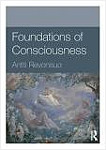 Antti Revonsuo
Antti Revonsuo
Foundations of Consciousness
(Routledge 2017)
Consciousness is life as we experience it; we see, feel and think thanks to consciousness. This book provides an easy introduction to the foundations of consciousness. How can consciousness be measured scientifically? What happens to the mind and self when the brain gets injured? How does consciousness arise from brain activity? See Routledge | Amazon | Google
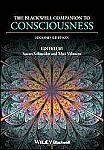 Susan Schneider & Max Velmans (eds.)
Susan Schneider & Max Velmans (eds.)
The Blackwell Companion to Consciousness
(Wiley 2017, 2nd revised edition)
Updated and revised, the second edition of this companion presents 54 peer-reviewed chapters written by leading experts in the study of consciousness, including 18 new theoretical, empirical, and methodological chapters covering integrated information theory, renewed interest in panpsychism, and more. Originally published in 2007. See Wiley | Amazon | Google
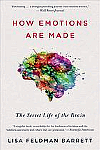 Lisa Feldman Barrett
Lisa Feldman Barrett
How Emotions Are Made: The Secret Life of the Brain
(Houghton Mifflin Harcourt 2017)
Barrett overturns the long-standing belief that emotions are automatic, universal and hardwired. She shows instead that we construct each instance of emotion through an interplay of brain, body and culture. Her lucid report from the cutting edge of emotion science reveals the profound consequences of this breakthrough for everything from medicine to national security. See Amazon | Google
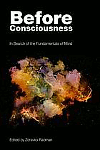 Zdravko Radman (ed.)
Zdravko Radman (ed.)
Before Consciousness: In Search of the Fundamentals of Mind
(Imprint 2017)
This collection of essays by leading scholars in consciousness aims to show that in order to understand mind as a whole we have to also consider its non-conscious part. Understanding the non-conscious is indispensable for a better understanding of consciousness: consciousness and the non-conscious are to be perceived as interconnected. See Imprint | Amazon | Google
 Joshua Gert
Joshua Gert
Primitive Colors: A Case Study in Neo-Pragmatist Metaphysics and Philosophy of Perception
(Oxford 2017)
An original account of color properties and of our perception of them. Gert employs a general philosophical strategy—neo-pragmatism—which makes use of deflationary accounts of notions like reference and truth. Applied to color, the result is a view on which colors are primitive properties of objects, irreducible to physical or dispositional properties. See Oxford | Amazon | Google
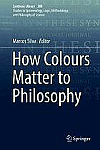 Marcos Silva (ed.)
Marcos Silva (ed.)
How Colours Matter to Philosophy
(Springer 2017)
This edited volume explores the different and seminal ways colours matter to philosophy. Each chapter provides an insightful analysis of one or more cases in which colours raise philosophical problems in different areas and periods of philosophy. Anyone interested in philosophical issues about colour will find it highly stimulating. See Springer | Amazon | Google
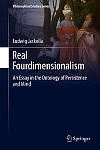 Ludwig Jaskolla
Ludwig Jaskolla
Real Fourdimensionalism: An Essay in the Ontology of Persistence and Mind
(Springer 2017)
This book explores persistence, taking human beings as an example case. It investigates how concrete particulars stay the same during their temporal carriers while changing significantly. A substantial contribution to debates concerning both stage-theoretic and non-reductive, naturalistic models of persistence. See Springer | Amazon | Google
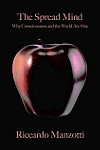 Riccardo Manzotti
Riccardo Manzotti
The Spread Mind: Why Consciousness and the World Are One
(OR Books 2017)
Where and how is consciousness stored in our bodies? In this book, Manzotti argues that our bodies do not contain subjective experience. Yet consciousness is real, and, like any other real phenomenon, is physical. Where is it, then? Manzotti’s radical hypothesis is that consciousness is one and the same as the physical world surrounding us. See OR Books | Amazon
 Anil Gomes & Andrew Stephenson (eds.)
Anil Gomes & Andrew Stephenson (eds.)
Kant and the Philosophy of Mind: Perception, Reason, and the Self
(Oxford 2017)
The fourteen specially-written essays essays in this volume explore those aspects of Kant’s writings which concern issues in the philosophy of mind. They showcase the depth of Kant’s writings in the philosophy of mind and reveal the continued relevance of his writings to contemporary debates about the nature of mind and self. See Oxford | Amazon | Google
 Shaun Gallagher
Shaun Gallagher
Enactivist Interventions: Rethinking the Mind
(Oxford 2017)
Is cognition in the head or in the world, or in some mix of brainy and worldly processes? A strong tradition in both philosophy of mind and cognitive science takes cognition to be a fully in-the-head event. Gallagher presents the contrasting view of enactivism, an embodied cognition approach that has roots in phenomenology and pragmatism. See Oxford | Amazon | Google
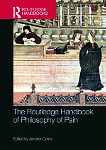 Jennifer Corns (ed.)
Jennifer Corns (ed.)
The Routledge Handbook of Philosophy of Pain
(Routledge 2017)
The phenomenon of pain might seem simple but there has been disagreement since Aristotle about whether pain is an emotion, sensation, perception, or disturbed state of the body. Despite advances in psychology, neuroscience, and medicine, pain is still poorly understood. This volume is a reference to the key debates in this area. See Routledge | Amazon | Google
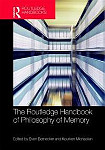 Sven Bernecker & K. Michaelian (eds.)
Sven Bernecker & K. Michaelian (eds.)
The Routledge Handbook of Philosophy of Memory
(Routledge 2017)
Memory occupies a fundamental place in philosophy, playing a central role not only in the history of philosophy but also in philosophy of mind, epistemology, and ethics. Yet the philosophy of memory has only recently emerged as an area of study and research in its own right. This volume is a reference to the key debates in this exciting new field. See Routledge | Amazon | Google
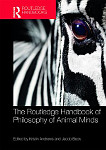 Kristin Andrews & Jacob Beck (eds.)
Kristin Andrews & Jacob Beck (eds.)
The Routledge Handbook of Philosophy of Animal Minds
(Routledge 2017)
While philosophers have been interested in animals since ancient times, in the last few decades the subject of animal minds has emerged as a major topic in philosophy. Comprising nearly fifty chapters by a team of international contributors, this volume is a reference to the key debates in this area and the first collection of its kind. See Routledge | Amazon | Google
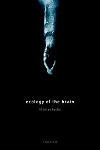 Thomas Fuchs
Thomas Fuchs
Ecology of the Brain: The Phenomenology and Biology of the Embodied Mind
(Oxford 2017)
Is the brain just a mediating organ? Fuchs considers the human body as a collective, a living being which uses the brain to mediate interactions within the human body and between the human body and its environment. The mind is not a product of the brain but an activity of the living being which integrates the brain within the everyday functions of the human body. See Oxford | Amazon | Google
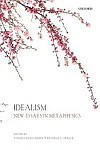 T. Goldschmidt & Kenneth L. Pearce (eds.)
T. Goldschmidt & Kenneth L. Pearce (eds.)
Idealism: New Essays in Metaphysics
(Oxford 2017)
Once dominant in Western philosophy, idealism has suffered almost total neglect in recent times. This book rectifies this by bringing together seventeen essays on a variety of idealistic theories, including not only Berkeleian and Kantian idealisms but also those from traditions less familiar to analytic philosophers, including Buddhism and Hassidic Judaism. See Oxford | Amazon | Google
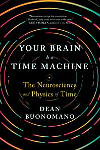 Dean Buonomano
Dean Buonomano
Your Brain Is a Time Machine: The Neuroscience and Physics of Time
(W. W. Norton 2017)
An investigation of the intricate relationship between the brain and time: What is time? Why does time seem to speed up or slow down? Is our sense that time flows an illusion? Drawing on physics, evolutionary biology, and philosophy, neuroscientist Dean Buonomano reveals that the brain’s ultimate purpose may be to predict the future. See W. W. Norton | Amazon | Google | New Scientist review
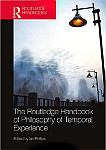 Ian Phillips (ed.)
Ian Phillips (ed.)
The Routledge Handbook of Philosophy of Temporal Experience
(Routledge 2017)
According to Husserl, temporal experience is the most important and difficult subject of all. Its puzzles and paradoxes were of critical interest from the early moderns to the post-Kantians. After a period of relative neglect, it is again at the forefront of debates across a wealth of areas, from philosophy of mind and psychology, to metaphysics and aesthetics. See Routledge | Amazon | Google
 Adrian Owen
Adrian Owen
Into the Gray Zone: A Neuroscientist Explores the Border Between Life and Death
(Simon & Schuster 2017)
Owen takes us into the “gray zone” between consciousness and brain death, occupied by those with traumatic brain injuries and victims of stroke or diseases like Alzheimer’s and Parkinson’s. While many are oblivious to the world and seem incapable of thought, a sizeable number may be intact minds within damaged bodies. See Simon & Schuster | Amazon | Google | New York Times review
 Dan Zahavi
Dan Zahavi
Husserl’s Legacy: Phenomenology, Metaphysics, and Transcendental Philosophy
(Oxford 2017)
Zahavi argues that Husserl was neither an internalist nor a quietist when it comes to metaphysical issues; that he assigned a fundamental importance to facticity and intersubjectivity; and that he was not opposed to all forms of naturalism. A proper grasp of his transcendental idealism shows that Husserl’s phenomenology is as much about the world as it is about consciousness. See Oxford | Amazon | Google
 Walter Ott
Walter Ott
Descartes, Malebranche, and the Crisis of Perception
(Oxford 2017)
The seventeenth century witnessed the demise of two core doctrines in the theory of perception: naïve realism about sensible qualities and the empirical theory behind it. This created a problem: how do we use qualities such as color and feel to locate objects in the world when these qualities are not real? Ott traces the debate over perceptual experience in early modern France. See Oxford | Amazon | Google
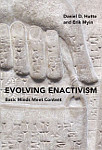 Daniel D. Hutto & Erik Myin
Daniel D. Hutto & Erik Myin
Evolving Enactivism: Basic Minds Meet Content
(MIT 2017)
Hutto and Myin argue that cognitive phenomena are best explained in terms of an interface between contentless and content-involving forms of cognition. Building on their previous work, Radicalizing Enactivism (2012), they show the value of recognizing that only some forms of cognition have content while others—the most elementary ones—do not. See MIT | Amazon | Google
 Galen Strawson
Galen Strawson
The Subject of Experience
(Oxford 2017)
This book collects most of the essays I have written on the self or subject of experience. They’re attempts—attempts to make something clear about the subject, the I, the self, the ‘first person.’ I’m not sure Valéry is right when he says that a poem is never finished, only abandoned, but I’m sure this is true of works of philosophy. See Oxford | Amazon | Google
 Erick Raphael Jiménez
Erick Raphael Jiménez
Aristotle’s Concept of Mind
(Cambridge 2017)
Drawing on a close analysis of De Anima, Jiménez argues that mind (nous) for Aristotle is neither disembodied nor innate, as has commonly been held, but an embodied ability that emerges from learning and discovery. Connecting this to Aristotle’s metaphysics and epistemology, he shows how this fits within Aristotle’s wider philosophy. See Cambridge | Amazon | Google
 Sebastian Watzl
Sebastian Watzl
Structuring Mind: The Nature of Attention and How it Shapes Consciousness
(Oxford 2017)
What is attention? How does attention shape consciousness? In an approach that engages with foundational topics in the philosophy of mind, the theory of action, psychology, and the neurosciences, Watzl shows that attention is a central structural feature of the mind and provides a unified and comprehensive answer to both questions. See Oxford | Amazon | Google
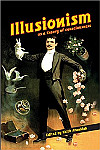 Keith Frankish (ed.)
Keith Frankish (ed.)
Illusionism: as a Theory of Consciousness
(Imprint 2017)
Illusionism is the view that phenomenal consciousness is an illusion. This reprint of a special issue of the Journal of Consciousness Studies consists of a target paper by the editor and commentaries from various thinkers, including leading defenders of the theory such as Daniel Dennett, Nicholas Humphrey, Derk Pereboom and Georges Rey. See Imprint | Amazon | Google
 Ted Honderich
Ted Honderich
Mind: Your Consciousness is What and Where?
(Reaktion Books 2017)
What does it mean for something or someone to be conscious? What is mind? Honderich reinvents our current understanding of these notions with this captivating introduction to his new and revolutionary theory, Actualism: a theory that rests on data that you share yourself, of consciousness that can be labelled as being actual. See Reaktion Books | Amazon | Google
 Markus Gabriel
Markus Gabriel
I am Not a Brain: Philosophy of Mind for the 21st Century
(Polity 2017, trans. Christopher Turner)
In this book, Gabriel challenges an increasing trend in the sciences towards neurocentrism, the assumption that the self is identical to the brain. In a sharp critique of this approach, he presents a new defense of free will and provides a timely introduction to philosophical thought about the self – all with verve, humor, and surprising insights. See Polity | Amazon | Google
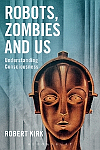 Robert Kirk
Robert Kirk
Robots, Zombies and Us: Understanding Consciousness
(Bloomsbury 2017)
Could robots be genuinely intelligent? Could they be conscious? Could there be zombies? Prompted by these questions Robert Kirk introduces the main problems of consciousness and sets out a new approach to solving them: a version of functionalism, according to which consciousness consists in the performance of functions. See Bloomsbury | Amazon | Google
 Jonardon Ganeri
Jonardon Ganeri
Attention, Not Self
(Oxford 2017)
An account of mind in which attention, not self, explains the experiential and normative situatedness of human beings in the world. A contribution to a growing body of work at the crossroads of three disciplines: analytic and phenomenological philosophy, cognitive science and empirical cognitive psychology, and Buddhist theoretical literature. See Oxford | Amazon | Google
 Emmanuel Alloa
Emmanuel Alloa
Resistance of the Sensible World: An Introduction to Merleau-Ponty
(Fordham 2017)
A handrail for venturing into the complexities of the work of Maurice Merleau-Ponty. Through a comprehensive analysis of the three main phases of his thinking and a thorough knowledge of his many unpublished manuscripts, Alloa traces how Merleau-Ponty’s philosophy evolved and reveals its remarkable coherence from within. See Fordham | Amazon | Google
 Riccardo Manzotti
Riccardo Manzotti
Consciousness and Object: A Mind-Object Identity Physicalist Theory
(John Benjamins 2017)
David Armstrong asked “What is a man?” and replied, “A certain sort of material object.” Manzotti starts similarly but proceeds differently. The traditional mind-brain identity theory is set aside and a mind-object identity theory proposed instead: to be conscious of an object is simply to be made of that object. Consciousness is material but not neural. See John Benjamins | Amazon | Google
 Mark Textor
Mark Textor
Brentano’s Mind
(Oxford 2017)
Mark Textor presents a critical study of the work of Franz Brentano, one of the most important thinkers of the nineteenth century and a pioneer of our understanding of the mind. His work has influenced analytic philosophers like Russell as well as phenomenologists like Husserl and Sartre, and continues to shape debates in the philosophy of mind. See Oxford | Amazon | Google
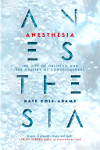 Kate Cole-Adams
Kate Cole-Adams
Anesthesia: The Gift of Oblivion and the Mystery of Consciousness
(Counterpoint 2017)
First there’s the injection, then counting backwards from ten—and suddenly, you’re awake. This book is the story of the time in-between, an exploration of that baffling gift of modern medicine: the disappearing act that enables us to undergo procedures which would otherwise be impossibly painful. It is among the most crucial and baffling gifts of modern medicine. See Counterpoint Press | Amazon | Google
 Michael Hymers
Michael Hymers
Wittgenstein on Sensation and Perception
(Routledge 2017)
Hymers offers two novel claims about Wittgenstein’s views of perception. First, that they are rooted in his reflections on sense-datum theories and the “misleading metaphor of phenomenal space.” Second, that his critique of this metaphor is still relevant because we persist in drawing inferences about the phenomenal that only apply to the physical. See Routledge | Amazon | Google
 Raymond Tallis
Raymond Tallis
Of Time and Lamentation: Reflections on Transience
(Agenda Publishing 2017)
For most of us, time is composed of mornings and evenings and expressed in hurry, hope, longing, waiting, enduring, planning, joyful expectation, and grief. Yet physics has little or nothing to say about this time, the time as it is lived. Our temporal lives, Tallis argues, deserve a richer attention than is afforded by the equations of mathematical physics. See Agenda | Amazon | Google
 Alan Burdick
Alan Burdick
Why Time Flies: A Mostly Scientific Investigation
(Simon & Schuster 2017)
“Time” is the most commonly used noun in the English language; it’s always on our minds and it advances through every living moment. But what is time, exactly? In this witty and meditative exploration, Burdick takes readers on a personal quest to understand how time gets in us and why we perceive it the way we do. See Simon & Schuster | Amazon | Google
 Philip Goff
Philip Goff
Consciousness and Fundamental Reality
(Oxford 2017)
Argues against the dominant solution to the mind-body problem—physicalism—and explores a new alternative: Russellian monism. Various forms are surveyed and key challenges discussed. Goff defends a cosmopsychist form of Russellian monism according to which all facts are grounded in facts about the conscious universe. See Oxford | Amazon | Google | Philip Goff’s page
 Daniel Dennett
Daniel Dennett
From Bacteria to Bach and Back: The Evolution of Minds
(W. W. Norton 2017)
In Dennett’s most comprehensive exploration of evolutionary thinking yet, he builds on ideas from computer science and biology to show how a comprehending mind could in fact have arisen from a mindless process of natural selection. This landmark work enlarges themes that have sustained his career at the forefront of philosophical thought. See W. W. Norton | Amazon | Google
 Michael Tye
Michael Tye
Tense Bees and Shell-Shocked Crabs: Are Animals Conscious?
(Oxford 2017)
Do birds have feelings? Can fish feel pain? Could a honeybee be anxious? For centuries, the question of animal consciousness has mystified philosophers and scientists. Blending the latest research about animal sensation with theories about the nature of consciousness, Tye develops a methodology for addressing the mysteries of the animal mind. See Oxford | Amazon | Google

Beyond Vision: Philosophical Essays
(Oxford 2017)
This volume brings together eight essays by O’Callaghan. They draw valuable lessons about perception, the nature of its objects, and sensory awareness, through sustained attention to extra-visual and multi-sensory forms of perceptual consciousness. O’Callaghan focuses on auditory perception, perception of spoken language, and multi-sensory perception. See Oxford | Amazon | Google

The Natural Problem of Consciousness
(De Gruyter 2017)
The natural problem of consciousness is that of understanding why conscious beings presently exist. Snider relates this problem to other problems in the philosophy of mind and emphasizes its diachronic dimension. Ranging over philosophy, biology, and neuroscience, he aims to understand why consciousness has evolved through natural selection. See De Gruyter | Amazon | Google

Experienced Wholeness
(MIT 2017)
How can we account for ‘phenomenal unity’ – our experience of objects, bodily experiences, successions of events, and the attentional structure of consciousness as wholes? Wiese develops an interdisciplinary account, showing how experiential wholes can be characterized and how such characterization can be analyzed conceptually and computationally. See MIT | Amazon | Google

Panpsychism in the West
(MIT 2017, revised edition)
Originally published in 2005, this updated edition covers the emergence of mind from a non-mental reality and the combination problem in greater detail. It offers expanded discussion of the pre-Socratics, Plato, Continental panpsychism, scientific arguments, Nietzsche, and Whitehead; as well as new sections on Augustine and Russellian monism. See MIT | Amazon | Google

Consciousness from a Broad Perspective: A Philosophical and Interdisciplinary Introduction
(Springer 2017)
An introduction to consciousness research within philosophy, psychology and neuroscience from a philosophical perspective and with an emphasis on the history of ideas. Hedman explores various approaches to consciousness and the mind-body problem, including mysterianist views and other radical approaches. The final two chapters present his personal view of the problem. See Springer | Amazon | Google

Plant Minds: A Philosophical Defense
(Routledge 2017)
In this book, Maher first presents the contemporary case for thinking that plants do not have minds. This case is rooted in the idea that having a mind requires the capacity to represent the world. Maher then defends a relatively new approach that rejects this assumption, making room for the possibility that plants do have minds, primarily because they are alive. See Routledge | Amazon | Google

The Subject’s Matter: Self-Consciousness and the Body
(MIT 2017)
The study of the body in such disciplines as cognitive psychology, cognitive neuroscience, psychiatry, and neuropsychology has advanced dramatically in the last two decades, accompanied by a resurgence of philosophical interest in the significance of the body in our mental life. The 16 specially-commissioned essays in this book reflect the advances in these fields. See MIT | Amazon | Google

I, Me, Mine: Back to Kant, and Back Again
(Oxford 2017)
What is self-consciousness and how does it relate to our use, in language and in thought, of the first-person pronoun ‘I’? Longuenesse presents an original exploration of our understanding of ourselves and the way we talk about ourselves and shows how Freudian metapsychology offers a path to a naturalization of Kant’s transcendental view of the mind. See Oxford | Amazon | Google

What Makes Time Special?
(Oxford 2017)
Central parts of the time we live by—the structured time of life—have no counterpart in the fundamental science of our world. We seem to have, to echo the consciousness debate, an “explanatory gap” between time as we use it in life and as we find it in science. Reconciling these two images of time is the principal goal of this book. See Oxford | Amazon | Google

Foundations of Consciousness
(Routledge 2017)
Consciousness is life as we experience it; we see, feel and think thanks to consciousness. This book provides an easy introduction to the foundations of consciousness. How can consciousness be measured scientifically? What happens to the mind and self when the brain gets injured? How does consciousness arise from brain activity? See Routledge | Amazon | Google

The Blackwell Companion to Consciousness
(Wiley 2017, 2nd revised edition)
Updated and revised, the second edition of this companion presents 54 peer-reviewed chapters written by leading experts in the study of consciousness, including 18 new theoretical, empirical, and methodological chapters covering integrated information theory, renewed interest in panpsychism, and more. Originally published in 2007. See Wiley | Amazon | Google

How Emotions Are Made: The Secret Life of the Brain
(Houghton Mifflin Harcourt 2017)
Barrett overturns the long-standing belief that emotions are automatic, universal and hardwired. She shows instead that we construct each instance of emotion through an interplay of brain, body and culture. Her lucid report from the cutting edge of emotion science reveals the profound consequences of this breakthrough for everything from medicine to national security. See Amazon | Google

Before Consciousness: In Search of the Fundamentals of Mind
(Imprint 2017)
This collection of essays by leading scholars in consciousness aims to show that in order to understand mind as a whole we have to also consider its non-conscious part. Understanding the non-conscious is indispensable for a better understanding of consciousness: consciousness and the non-conscious are to be perceived as interconnected. See Imprint | Amazon | Google

Primitive Colors: A Case Study in Neo-Pragmatist Metaphysics and Philosophy of Perception
(Oxford 2017)
An original account of color properties and of our perception of them. Gert employs a general philosophical strategy—neo-pragmatism—which makes use of deflationary accounts of notions like reference and truth. Applied to color, the result is a view on which colors are primitive properties of objects, irreducible to physical or dispositional properties. See Oxford | Amazon | Google

How Colours Matter to Philosophy
(Springer 2017)
This edited volume explores the different and seminal ways colours matter to philosophy. Each chapter provides an insightful analysis of one or more cases in which colours raise philosophical problems in different areas and periods of philosophy. Anyone interested in philosophical issues about colour will find it highly stimulating. See Springer | Amazon | Google

Real Fourdimensionalism: An Essay in the Ontology of Persistence and Mind
(Springer 2017)

This book explores persistence, taking human beings as an example case. It investigates how concrete particulars stay the same during their temporal carriers while changing significantly. A substantial contribution to debates concerning both stage-theoretic and non-reductive, naturalistic models of persistence. See Springer | Amazon | Google

The Spread Mind: Why Consciousness and the World Are One
(OR Books 2017)
Where and how is consciousness stored in our bodies? In this book, Manzotti argues that our bodies do not contain subjective experience. Yet consciousness is real, and, like any other real phenomenon, is physical. Where is it, then? Manzotti’s radical hypothesis is that consciousness is one and the same as the physical world surrounding us. See OR Books | Amazon

Kant and the Philosophy of Mind: Perception, Reason, and the Self
(Oxford 2017)
The fourteen specially-written essays essays in this volume explore those aspects of Kant’s writings which concern issues in the philosophy of mind. They showcase the depth of Kant’s writings in the philosophy of mind and reveal the continued relevance of his writings to contemporary debates about the nature of mind and self. See Oxford | Amazon | Google

Enactivist Interventions: Rethinking the Mind
(Oxford 2017)
Is cognition in the head or in the world, or in some mix of brainy and worldly processes? A strong tradition in both philosophy of mind and cognitive science takes cognition to be a fully in-the-head event. Gallagher presents the contrasting view of enactivism, an embodied cognition approach that has roots in phenomenology and pragmatism. See Oxford | Amazon | Google

The Routledge Handbook of Philosophy of Pain
(Routledge 2017)
The phenomenon of pain might seem simple but there has been disagreement since Aristotle about whether pain is an emotion, sensation, perception, or disturbed state of the body. Despite advances in psychology, neuroscience, and medicine, pain is still poorly understood. This volume is a reference to the key debates in this area. See Routledge | Amazon | Google

The Routledge Handbook of Philosophy of Memory
(Routledge 2017)

Memory occupies a fundamental place in philosophy, playing a central role not only in the history of philosophy but also in philosophy of mind, epistemology, and ethics. Yet the philosophy of memory has only recently emerged as an area of study and research in its own right. This volume is a reference to the key debates in this exciting new field. See Routledge | Amazon | Google

The Routledge Handbook of Philosophy of Animal Minds
(Routledge 2017)
While philosophers have been interested in animals since ancient times, in the last few decades the subject of animal minds has emerged as a major topic in philosophy. Comprising nearly fifty chapters by a team of international contributors, this volume is a reference to the key debates in this area and the first collection of its kind. See Routledge | Amazon | Google

Ecology of the Brain: The Phenomenology and Biology of the Embodied Mind
(Oxford 2017)
Is the brain just a mediating organ? Fuchs considers the human body as a collective, a living being which uses the brain to mediate interactions within the human body and between the human body and its environment. The mind is not a product of the brain but an activity of the living being which integrates the brain within the everyday functions of the human body. See Oxford | Amazon | Google

Idealism: New Essays in Metaphysics
(Oxford 2017)
Once dominant in Western philosophy, idealism has suffered almost total neglect in recent times. This book rectifies this by bringing together seventeen essays on a variety of idealistic theories, including not only Berkeleian and Kantian idealisms but also those from traditions less familiar to analytic philosophers, including Buddhism and Hassidic Judaism. See Oxford | Amazon | Google

Your Brain Is a Time Machine: The Neuroscience and Physics of Time
(W. W. Norton 2017)
An investigation of the intricate relationship between the brain and time: What is time? Why does time seem to speed up or slow down? Is our sense that time flows an illusion? Drawing on physics, evolutionary biology, and philosophy, neuroscientist Dean Buonomano reveals that the brain’s ultimate purpose may be to predict the future. See W. W. Norton | Amazon | Google | New Scientist review

The Routledge Handbook of Philosophy of Temporal Experience
(Routledge 2017)
According to Husserl, temporal experience is the most important and difficult subject of all. Its puzzles and paradoxes were of critical interest from the early moderns to the post-Kantians. After a period of relative neglect, it is again at the forefront of debates across a wealth of areas, from philosophy of mind and psychology, to metaphysics and aesthetics. See Routledge | Amazon | Google

Into the Gray Zone: A Neuroscientist Explores the Border Between Life and Death
(Simon & Schuster 2017)
Owen takes us into the “gray zone” between consciousness and brain death, occupied by those with traumatic brain injuries and victims of stroke or diseases like Alzheimer’s and Parkinson’s. While many are oblivious to the world and seem incapable of thought, a sizeable number may be intact minds within damaged bodies. See Simon & Schuster | Amazon | Google | New York Times review

Husserl’s Legacy: Phenomenology, Metaphysics, and Transcendental Philosophy
(Oxford 2017)
Zahavi argues that Husserl was neither an internalist nor a quietist when it comes to metaphysical issues; that he assigned a fundamental importance to facticity and intersubjectivity; and that he was not opposed to all forms of naturalism. A proper grasp of his transcendental idealism shows that Husserl’s phenomenology is as much about the world as it is about consciousness. See Oxford | Amazon | Google

Descartes, Malebranche, and the Crisis of Perception
(Oxford 2017)

The seventeenth century witnessed the demise of two core doctrines in the theory of perception: naïve realism about sensible qualities and the empirical theory behind it. This created a problem: how do we use qualities such as color and feel to locate objects in the world when these qualities are not real? Ott traces the debate over perceptual experience in early modern France. See Oxford | Amazon | Google

Evolving Enactivism: Basic Minds Meet Content
(MIT 2017)
Hutto and Myin argue that cognitive phenomena are best explained in terms of an interface between contentless and content-involving forms of cognition. Building on their previous work, Radicalizing Enactivism (2012), they show the value of recognizing that only some forms of cognition have content while others—the most elementary ones—do not. See MIT | Amazon | Google

The Subject of Experience
(Oxford 2017)
This book collects most of the essays I have written on the self or subject of experience. They’re attempts—attempts to make something clear about the subject, the I, the self, the ‘first person.’ I’m not sure Valéry is right when he says that a poem is never finished, only abandoned, but I’m sure this is true of works of philosophy. See Oxford | Amazon | Google

Aristotle’s Concept of Mind
(Cambridge 2017)
Drawing on a close analysis of De Anima, Jiménez argues that mind (nous) for Aristotle is neither disembodied nor innate, as has commonly been held, but an embodied ability that emerges from learning and discovery. Connecting this to Aristotle’s metaphysics and epistemology, he shows how this fits within Aristotle’s wider philosophy. See Cambridge | Amazon | Google

Structuring Mind: The Nature of Attention and How it Shapes Consciousness
(Oxford 2017)
What is attention? How does attention shape consciousness? In an approach that engages with foundational topics in the philosophy of mind, the theory of action, psychology, and the neurosciences, Watzl shows that attention is a central structural feature of the mind and provides a unified and comprehensive answer to both questions. See Oxford | Amazon | Google

Illusionism: as a Theory of Consciousness
(Imprint 2017)
Illusionism is the view that phenomenal consciousness is an illusion. This reprint of a special issue of the Journal of Consciousness Studies consists of a target paper by the editor and commentaries from various thinkers, including leading defenders of the theory such as Daniel Dennett, Nicholas Humphrey, Derk Pereboom and Georges Rey. See Imprint | Amazon | Google

Mind: Your Consciousness is What and Where?
(Reaktion Books 2017)

What does it mean for something or someone to be conscious? What is mind? Honderich reinvents our current understanding of these notions with this captivating introduction to his new and revolutionary theory, Actualism: a theory that rests on data that you share yourself, of consciousness that can be labelled as being actual. See Reaktion Books | Amazon | Google

I am Not a Brain: Philosophy of Mind for the 21st Century
(Polity 2017, trans. Christopher Turner)
In this book, Gabriel challenges an increasing trend in the sciences towards neurocentrism, the assumption that the self is identical to the brain. In a sharp critique of this approach, he presents a new defense of free will and provides a timely introduction to philosophical thought about the self – all with verve, humor, and surprising insights. See Polity | Amazon | Google

Robots, Zombies and Us: Understanding Consciousness
(Bloomsbury 2017)
Could robots be genuinely intelligent? Could they be conscious? Could there be zombies? Prompted by these questions Robert Kirk introduces the main problems of consciousness and sets out a new approach to solving them: a version of functionalism, according to which consciousness consists in the performance of functions. See Bloomsbury | Amazon | Google

Attention, Not Self
(Oxford 2017)
An account of mind in which attention, not self, explains the experiential and normative situatedness of human beings in the world. A contribution to a growing body of work at the crossroads of three disciplines: analytic and phenomenological philosophy, cognitive science and empirical cognitive psychology, and Buddhist theoretical literature. See Oxford | Amazon | Google

Resistance of the Sensible World: An Introduction to Merleau-Ponty
(Fordham 2017)
A handrail for venturing into the complexities of the work of Maurice Merleau-Ponty. Through a comprehensive analysis of the three main phases of his thinking and a thorough knowledge of his many unpublished manuscripts, Alloa traces how Merleau-Ponty’s philosophy evolved and reveals its remarkable coherence from within. See Fordham | Amazon | Google

Consciousness and Object: A Mind-Object Identity Physicalist Theory
(John Benjamins 2017)
David Armstrong asked “What is a man?” and replied, “A certain sort of material object.” Manzotti starts similarly but proceeds differently. The traditional mind-brain identity theory is set aside and a mind-object identity theory proposed instead: to be conscious of an object is simply to be made of that object. Consciousness is material but not neural. See John Benjamins | Amazon | Google

Brentano’s Mind
(Oxford 2017)
Mark Textor presents a critical study of the work of Franz Brentano, one of the most important thinkers of the nineteenth century and a pioneer of our understanding of the mind. His work has influenced analytic philosophers like Russell as well as phenomenologists like Husserl and Sartre, and continues to shape debates in the philosophy of mind. See Oxford | Amazon | Google

Anesthesia: The Gift of Oblivion and the Mystery of Consciousness
(Counterpoint 2017)
First there’s the injection, then counting backwards from ten—and suddenly, you’re awake. This book is the story of the time in-between, an exploration of that baffling gift of modern medicine: the disappearing act that enables us to undergo procedures which would otherwise be impossibly painful. It is among the most crucial and baffling gifts of modern medicine. See Counterpoint Press | Amazon | Google

Wittgenstein on Sensation and Perception
(Routledge 2017)
Hymers offers two novel claims about Wittgenstein’s views of perception. First, that they are rooted in his reflections on sense-datum theories and the “misleading metaphor of phenomenal space.” Second, that his critique of this metaphor is still relevant because we persist in drawing inferences about the phenomenal that only apply to the physical. See Routledge | Amazon | Google

Of Time and Lamentation: Reflections on Transience
(Agenda Publishing 2017)
For most of us, time is composed of mornings and evenings and expressed in hurry, hope, longing, waiting, enduring, planning, joyful expectation, and grief. Yet physics has little or nothing to say about this time, the time as it is lived. Our temporal lives, Tallis argues, deserve a richer attention than is afforded by the equations of mathematical physics. See Agenda | Amazon | Google

Why Time Flies: A Mostly Scientific Investigation
(Simon & Schuster 2017)

“Time” is the most commonly used noun in the English language; it’s always on our minds and it advances through every living moment. But what is time, exactly? In this witty and meditative exploration, Burdick takes readers on a personal quest to understand how time gets in us and why we perceive it the way we do. See Simon & Schuster | Amazon | Google

Consciousness and Fundamental Reality
(Oxford 2017)
Argues against the dominant solution to the mind-body problem—physicalism—and explores a new alternative: Russellian monism. Various forms are surveyed and key challenges discussed. Goff defends a cosmopsychist form of Russellian monism according to which all facts are grounded in facts about the conscious universe. See Oxford | Amazon | Google | Philip Goff’s page

From Bacteria to Bach and Back: The Evolution of Minds
(W. W. Norton 2017)
In Dennett’s most comprehensive exploration of evolutionary thinking yet, he builds on ideas from computer science and biology to show how a comprehending mind could in fact have arisen from a mindless process of natural selection. This landmark work enlarges themes that have sustained his career at the forefront of philosophical thought. See W. W. Norton | Amazon | Google

Tense Bees and Shell-Shocked Crabs: Are Animals Conscious?
(Oxford 2017)
Do birds have feelings? Can fish feel pain? Could a honeybee be anxious? For centuries, the question of animal consciousness has mystified philosophers and scientists. Blending the latest research about animal sensation with theories about the nature of consciousness, Tye develops a methodology for addressing the mysteries of the animal mind. See Oxford | Amazon | Google
Menu
 What’s a logical paradox?
What’s a logical paradox? Achilles & the tortoise
Achilles & the tortoise The surprise exam
The surprise exam Newcomb’s problem
Newcomb’s problem Newcomb’s problem (sassy version)
Newcomb’s problem (sassy version) Seeing and being
Seeing and being Logic test!
Logic test! Philosophers say the strangest things
Philosophers say the strangest things Favourite puzzles
Favourite puzzles Books on consciousness
Books on consciousness Philosophy videos
Philosophy videos Phinteresting
Phinteresting Philosopher biographies
Philosopher biographies Philosopher birthdays
Philosopher birthdays Draft
Draftbarang 2009-2024  wayback machine
wayback machine
 wayback machine
wayback machine